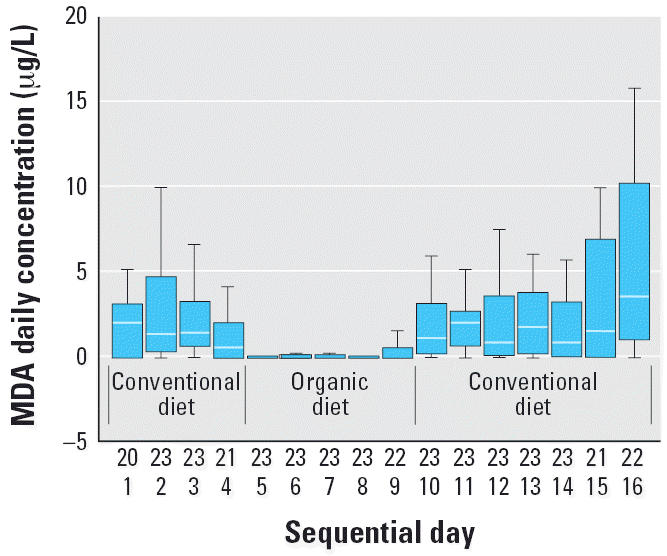|
There is a widely held belief that organic food is better for you in many ways when compared to conventionally grown produce. There are three main claims out there that I want to explain in a little bit of detail.  Organic food is more Nutritious This particular claim is one that has been batted about by the scientific community for as long as there has been the two farming systems. It is really dependent on on what studies you look at and how you interpret and represent the data in those studies. One of the biggest peer review studies on the subject came out of Newcastle University in the UK. It combined and averaged out results from 343 different studies and they found that the nutrition content was up to 60% higher than conventionally grown goods. This result flies in the face of a earlier study done by the the UK Food Standards Agency which in 2009 showed no clear evidence of improved nutrition in organic foods. In the US reviews done by Stanford University on many of the same studies used by the Newcastle University show no appreciable difference between organic and conventionally grown foods. So what is a person to think when leading universities in research cannot make up their minds when it comes to the nutrient content of organic foods. Well the research does seem to agree on a couple of things. The first is that there has not been sufficient side by side testing of organically and conventionally grown food. So the data we have is suspect since the compared crops were grown in many different locations and over different years. The second factor they agree on is that there has not been enough time to determine whether eating organic will have a impact over a lifetime. So in the end when it comes to nutrition we don't know yet conclusively whether organic or conventionally grown food is better for you. Organic Food has less Chemical Exposure This claim is absolutely correct and has been proven to be true in many trials and field tests. For example a study published in the Environmental Healthy Perspective scientific journal found a clear reduction of organophosphates in the urine of children that were eating exclusively organic diets. Organophosphates are a widely used insecticide chemical in fruit and vegetable production. It affects the nervous system of the target insects and eventually kills them. Now in large enough doses this chemical can also affect the nervous systems of humans. So we know that chemical exposure is less in organic production than in conventional production but if you take the right steps even conventionally grown food can be safe to eat. Basic things like washing your fruits and vegetables can greatly reduce any potential exposure. Plus the typical person will not get exposed to enough chemical reside from their food to cause them any real harm. The people that apply the chemicals to fields however do run a real risk of over exposure to whatever they are applying. So even if the chemicals are not a large concern for you as a consumer the real damage could be happening the the workers producing the food. Keep that in mind as you are deciding whether or not to buy organic food. Organic Food is better for the Environment The third and final claim on my list is undeniably true as well. When you look at the agricultural practices that are used to produce organic food you see that they are much less damaging to the land they are used on. Growing organically uses natural fertilizers like manure and cover crops to add and trap nutrients in the soil. Then by using crop rotations and no-till farming they allow the soil to recover from years of abuse from single cropping and cultivation. The organic method restores nutrient cycling and fosters a healthier more resilient soil. When you compare this to conventional farming which essentially turns the soil into a sponge that is there to soak up chemicals it is undeniably better for the environment. How this is better for you is that it helps restore natural cycles and ecology of the landscape that you live in. Crop fields are not a separate entity from the local ecosystems and they cannot be treated as such. When you treat them well you receive the benefits of clean air, water and healthy soil, all of which make for a healthier you. So in the end it is the opinion of this humble environmentalist that organic is the way to go for a better, healthier you. But do to expense of organic produce it is still out of daily reach for many people. But despite the expense I believe that organic food is something that should be eaten as often as possible. Sources: http://med.stanford.edu/news/all-news/2012/09/little-evidence-of-health-benefits-from-organic-foods-study-finds.html http://www.ncl.ac.uk/press.office/press.release/item/new-study-finds-significant-differences-between-organic-and-non-organic-food http://emedicine.medscape.com/article/1175139-overview http://www.ncbi.nlm.nih.gov/pmc/articles/PMC1367841/
0 Comments
Leave a Reply. |
AuthorHello my name is Josh Larson and I am the creator of the Green Living Library. Here on the blog you will find updates to content found in the Green Living Library as well as stories from those living the sustainable life already. Archives
December 2021
Categories
All
|